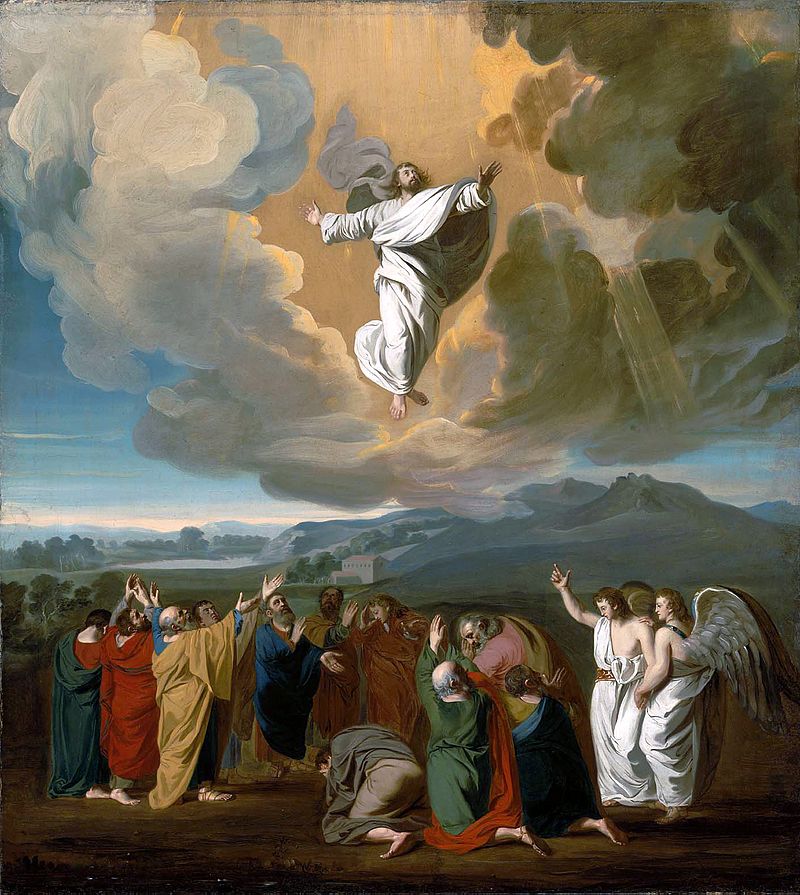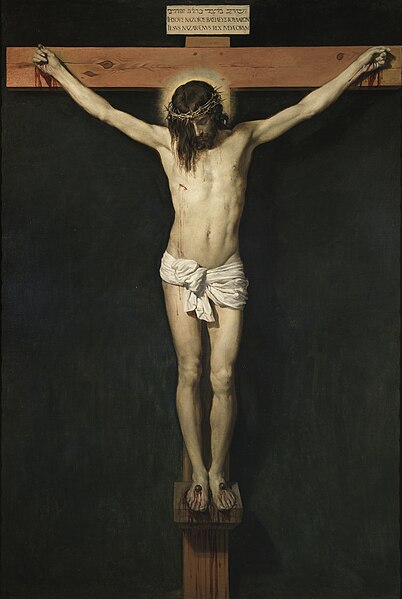Acts 1:6-14
 |
| John Singleton Copley, Ascension 1775 (PD) |
This is the season of graduations, commencement ceremonies, and the famed commencement address!
These days, colleges and universities seem to try and outdo one another by getting the most famous celebrities or figureheads to give a commencement address to their graduating students.
Large amounts of money are spent to attract these figures to give speeches that motivate, encourage, or just generally entertain those in attendance.
It is also customary to offer the individual giving the commencement address an honorary Doctorate, as opposed to a research or professional Doctorate that is given to those who work tirelessly to receive the title of “Doctor.”
In 2016, Time magazine listed the top 10 graduation speeches of all time.
The list included the likes of Steve Jobs, Conan O’Brien, Winston Churchill, and JFK just to name a few.
And the speeches contained all sorts of nuggets of advice to the college or university’s graduates.
Nuggets like;
“Sometimes life hits you in the head with a brick”
and
“Your biggest liability is the need to always find yourself on the sweet side of the bell curve”
or my favorite
“eventually some very nice people will give you a doctorate in fine arts for doing jack squat”
In the midst of all these insightful tidbits, Jesus’ address to his disciples in our First Lesson from Acts doesn’t really make the cut.
Earlier this year, as we began to study the Sermon on the Mount, I claimed that Jesus had the best inauguration address ever.
I stand by that claim, but in the same breath, I have to say, this may be the worst commencement address ever, at least based on our standards today.
Given the time of year, both in the fact that it is graduation season and it is our last Sunday of Easter, I started reflecting on this particular telling of the Ascension of our Lord.
It really is a graduation of sorts.
 |
| Graduation, Picture courtesy of Unsplash taken by Faustin Tuyambaze |
The Ascension of Jesus was added to Mark’s Gospel at a much later date, and the only other account of the Ascension found, outside of the book of Acts, is found in Luke which is written by the same author.
Luke’s telling is much shorter and the shortened account portrays the disciples so much more confidently.
It strikes me as a far clumsier telling then the slack jawed disciples staring up into the heavens muttering in shock as we find them in Acts.
After all, I think that would have been my reaction.
But the greater problem for me, is in the response of the disciples in Luke’s account of this episode.
They just go bouncing back into Jerusalem, whistling and skipping as if all is right with the world.
No shock at what they have just witnessed,
No fear of the community in Jerusalem, which still hasn’t gotten over the scene caused by Jesus or his followers.
No grief over the departure of their friend and teacher.
But the greater concern for me in this telling, is their complete lack of hesitation to respond to the mission that they are being called to.
Its as if all doubt, questioning, or skepticism has just been thrown to the wind carelessly.
And given all they had seen during Jesus’ ministry, his crucifixion, and his resurrection, I find that to be a pretty hard pill to swallow.
But the account in our first lesson, the account from Acts, portraying the disciples frozen in shock, gawking into the sky.
That is the deeper story that I believe the author of Luke and Acts really wanted to capture in this moment.
Because, in spite of the parties, the gifts, the speeches, and the honors bestowed at graduations, graduations leave most of us feeling a little like a deer in headlights.
A graduation from anything implies one thing alone; you’ve received the tools necessary for the next step.
And oftentimes that next step is a doozy.
Sometimes that next step lands you in the basement of your mom’s duplex playing Xbox and eating cheetohs all night while wondering why employers haven’t come knocking on your door longing for your rare skillset of eastern herbology with a minor in puppetry.
But regardless of the tools gained under the careful discipleship of another -in anything- there comes a time when one must strike out on their own.
And kinda like the graduate that just wants to remain in the basement of their parent’s duplex, Jesus’ disciples are still looking inward.
Inward toward the restoration of their OWN house, Israel.
Inward for a personal assurance that Jesus is going to continue to line up their interview and put in a good word for them with the Father, the big Boss, with a capital B!
The downside is that they’ve landed the job before they even knew what they were interviewing for,
And be careful what you wish for, because sometimes the perfect gig isn’t such a hot deal once you punch the clock on Monday morning.
For the disciples, the perks of this gig may not be everything they dreamed of.
But this isn’t just a gig that these disciples are called to, it is a gig we are all called to.
Next week is Pentecost and our confirmands will affirm their baptisms before the congregation, professing their faith for themselves.
| Herrad of Landsberg, Hortus Deliciarum 1180 (PD) |
And over the past year with them, I have continuously emphasized that this is not a graduation from church.
I’m not the only pastor to make such a claim, it is a claim made by many pastors.
But as I look at our first lesson today, I have to reconsider that claim.
Because confirmation IS a graduation of sorts, and don’t think I haven’t anticipated that twinkle in your eyes if you are being confirmed next week!
That doesn’t mean you STOP coming to church!
It means you are charged to take church out into the world with you, this isn’t a graduation FROM some thing, it is a graduation INTO the same mission as that of the disciples!
And that is a call and a mission that we all need to be reminded of, not just our confirmands.
Jesus’ call and charge to his disciples lands on the 40th day of Easter, creating a significant pause in the final 10 days of Easter between the Ascension and Pentecost.
A chance to brace oneself for the mission ahead, because when the Holy Spirit arrives all excuses are off.
Following the disciples questioning about the restoration of their own house, the restoration of Israel
The commencement address Jesus has given is short, sweet, and not very inspirational;
Jesus basically tells the disciples that the fate of Israel is none of their business, nor are the intentions of God for the rest of the world.
Instead, Jesus offers a consolation prize; “You will receive a power, a power unlike any power you’ve ever seen, a power that comes from the Holy Spirit”
Then Jesus tells them that when that power arrives, its time to leave the basement, its time to pack up the Xbox and the George Foreman and get to work.
Taking the mission way beyond the safe spaces they found comfort in, far beyond the persecution they could once deflect onto Jesus.
The mission now falls on them, on their shoulders, out in the world.
And this isn’t just a mission given to them, but to us all.
~
In JRR Tolkein’s Lord of the Rings he shares the story of Frodo Baggins who is a small fantasy creature called a Hobbit.
The story follows Frodo on his journey to destroy a ring that symbolizes power and humanity’s lust for that power.
Frodo is tasked with destroying the ring in order to save all living things and to save humanity from itself.
Tolkein obviously was offering a different slant on the Gospels.
At the conclusion of these books, following many battles and the destruction of the ring, Frodo and the three other Hobbits who accompanied him on his journey take one final journey to meet a ship that will take Frodo to a place called “the Havens.”
Frodo’s companion throughout the book, Sam, is grief stricken when he discovers that his friend, Frodo, is going off to this far off heaven-like place without him.
“Where are you going, Master?” cries Sam
“To the Havens, Sam” responds Frodo
Sam continues sharing his expectation that Frodo would remain in their village, their Shire, with him, being the only person who knows Sam the way Frodo does,
the only one who can ever truly know him after all they went through together but Frodo explains;
“I thought too, once -that I could remain in the Shire with you-. but I have been too deeply hurt, Sam. I tried to save the Shire, and it has been saved, but not for me. It must often be so, Sam, when things are in danger some one has to give them up, lose them, so that others may keep them. But you are my heir: all that I had and might have had I leave to you. Your hands and your wits will be needed everywhere. You will keep alive the memory of the age that is gone, so that people will remember the Great Danger and so love their beloved land all the more. And that will keep you as busy and as happy as anyone can be, as long as your part of the Story goes on.”
When the vessel departs with Frodo aboard, Tolkein’s story comes to a close, as Frodo’s three companions stand together on the shore, watching the empty sea in silence as the ship that has long since departed is no longer in sight.
Until “At last the three companions turned away, and never again looking back they rode slowly homewards; and they spoke no word to one another until they came back to the Shire, but each had great comfort in his friends on the long grey road.”
Tolkein denied the personal nature of this story, all the way to his grave.
But Tolkein spent most of his life watching those who knew him best leave this life.
As a young British Officer in the trenches of World War One, he watched as those who knew him best and had shared his journey, left him alone in life.
And he could have just stood beside their graves, on the shore gazing across the sea, or staring into the heavens.
But much like the disciples, like Sam, like us all, he was called to share a story that collected others into a mission we share.
A mission that is not focused on our place in heaven, looking for some divine reward.
But a mission that calls others to hear the good news and the promise that God continues to reveal through the church.
A Church not intended to stand stagnant and look inwardly towards itself,
 |
| Picture courtesty of Unsplash taken by Stefan Kunze |
but a Church that is called to reach out to all people.
A Church called to reach out to Samaritans and Judeans alike, two cultures of people that would sooner kill one another than share a crust of bread.
A Church that would reach out to a people who were the very definition of unclean, the Gentiles.
A Church that would reach out to the very empire who nailed Christ to that cross in the first place.
A Church that reaches well beyond it’s safe spaces
~
An Op-Ed writer for the New York Times, Bret Stephens, was asked to give the commencement address at Hamden-Sydney College a few weeks ago.
Stephens focused his speech on the rise of “safe spaces” on college campuses and he described them as;
“a place, usually on a campus, where like minded people - often sharing the same race, gender, sexual orientation, or political outlook- can spend time together without having to encounter the expression of any ideas or opinions that they do not endorse.”
He went on to point out how we all retreat to our safe spaces, conservatives by watching Fox News and liberals by watching MSNBC, some by only subscribing to periodicals and columns that endorse our views, and oftentimes even surrounding ourselves with social media that is a digitally structured “safe space.”
The speech closed by proclaiming passionately that “Safe spaces, physical and intellectual, are for children. You are grown-ups now. If your diplomas mean anything, it’s that it is time you leave those safe spaces behind forever.”
Sisters and brothers, this is the final Sunday of Easter.
Next week is Pentecost and that is the time when the church is given a power like no other,
it is a call to stop crying out in celebration that HE IS RISEN,
it is a call to go out into a world, well beyond our own safe spaces and proclaim the good news to all people, people that may not even think they need to hear it.
And not with our eyes fixed on the sky for some heavenly reward, but because it was the gift first given to us and it is therefore, certainly a treasure that we are called to share.
Amen.
 |
| Picture courtesy of Unsplash, taken by Mike Wilson |
Sources
Stephens, Bret. "Leave Your Safe Spaces: The 2017 Commencement Address at Hampden-Sydney College." The New York Times. May 15, 2017. Accessed May 25, 2017. https://www.nytimes.com/2017/05/15/opinion/leave-your-safe-spaces-the-2017-commencement-address-at-hampden-sydney-college.html?ref=opinion&_r=0.
Tolkien, J. R. R. The lord of the rings. Boston: Houghton Mifflin, 2005.
"Top 10 Commencement Speeches." Time. Accessed May 25, 2017. http://content.time.com/time/specials/packages/completelist/0,29569,1898670,00.html.





